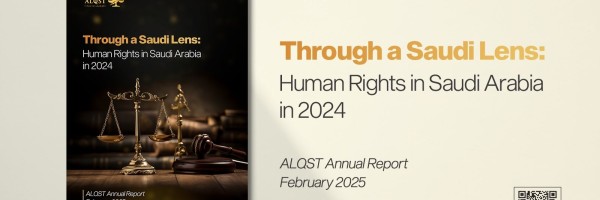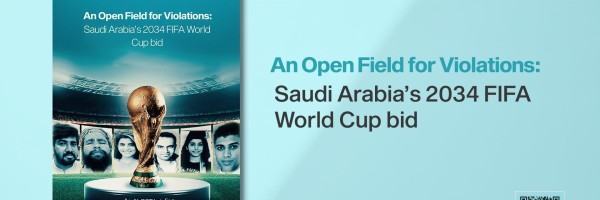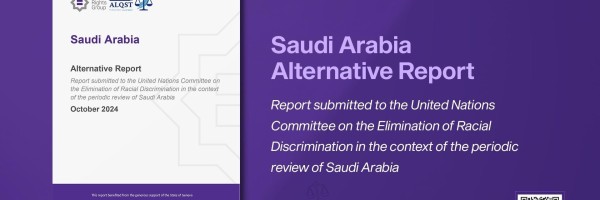On 2 October 2018, the Saudi journalist Jamal Khashoggi entered the Saudi consulate in Istanbul to obtain papers he needed to get married. Immediately following his disappearance, the Saudi authorities denied all knowledge of his fate, but later, after switching their story a number of times, they finally admitted that Khashoggi had been killed inside the consulate.
ALQST is publishing here, for the record, the executive summary of the report of the UN Special Rapporteur on extrajudicial, summary or arbitrary executions, Agnès Callamard, on her investigation into the unlawful death of Jamal Khashoggi. On the Arabic side of our website we are also publishing the first Arabic translation of the text, carried out by a team of volunteer activists in collaboration with “The Great Saudi Podcast”.
You can download and read the full text here.
Executive summary
State Responsibilities
1. Mr. Khashoggi’s killing constituted an extrajudicial killing for which the Stateof the Kingdom of Saudi Arabia isresponsible. His attempted kidnapping would also constitute a violation under international human rights law. From the perspective of international human rights law, State responsibility is not a question of, for example, which of the State officials ordered Mr. Khashoggi’s death; whether one or more ordered a kidnapping that was botched and then became an accidental killing; or whether the officers acted on their own initiative or ultra vires.
2. The killing of Mr. Khashoggi further constituted a violation of the Vienna Convention on Consular Relations (thereafter VCCR) and of the prohibition against the extra-territorial use of force in time of peace (customary law and UN Charter). In killing a journalist, the State of Saudi Arabia also committed an act inconsistent with a core tenet of the United Nations, the protection of freedom of expression. As such, it can be credibly argued that it used force extra-territorially in a manner “inconsistent with the Purposes of the United Nations.”
3. Further, the circumstances of the killing of Mr. Khashoggi may constitute an act of torture under the terms of the Convention Against Torture, ratified by Saudi Arabia. Finally, the killing of Mr. Khashoggi may also constitute to this date an enforced disappearance since the location of his remains has not been established.
Individual liability
4. The Special Rapporteur has determined that there is credible evidence, warranting further investigation of high-level Saudi Officials’ individual liability, including the Crown Prince’s. She warnsagainst a disproportionate emphasis on identifying who ordered the crime, pointing out that the search for justice and accountability is not singularly dependent on finding a smoking gun and the person holding it. The search is also, if not primarily, about identifying those who, in the context of the commission of a violation, have abused, or failed to fulfill, the responsibilities of their positions of authority.
Duty to investigate and consular immunity
5. The Special Rapporteur has found that both the investigations conducted by Saudi Arabia and Turkey failed to meet international standards regarding the investigation into unlawful deaths.
6. Saudi officials were present in the Saudi consulate and residence in Istanbul from 6 to 15 October during which time they presumably investigated the killing. However, the Special Rapporteur was not provided with any information regarding the evidence they may have collected during this period. The Saudi Public Prosecution made public a few of their findings on 15 November but the statement was light on details, limiting itself to a few general allegations. Other statements regarding the actions and responsibilities of specific individuals were a welcomed step. However, the Special Rapporteur notes that some of the individuals allegedly referenced in these statements and the identity of 11 perpetrators currently on trial do not match. Further, the Saudi authorities have yet to disclose the whereabouts of the remains of Mr. Khashoggi.
7. The Special Rapporteur found that under the terms of the VCCR, Saudi authorities were under no legal obligation to grant access to the Consular premises to the Turkish investigators. However, Saudi Arabia was under an international obligation tocooperate with the Turkish authorities in the investigation of the killing of Mr. Khashoggi. Such cooperation necessarily demanded that they gave access to the consulate to the Turkish authorities in a prompt and effective fashion and in good faith. Consular immunity was never intended to enable impunity.
8. The Special Rapporteur found credible evidence pointing to the crime scenes having been thoroughly, even forensically, cleaned. These indicate that the Saudi investigation was not conducted in good faith, and that it may amount to obstructing justice.
9. Turkish investigators, accompanied by Saudi investigators, only had access to the Consulate on the 15th October for 6 hours and to the Consul’residenceon 17th October for around thirteen hours, where they also had to search the whole consular vehicle fleet. Their scientific and forensic inquiries were limited to “swabbing” and they were not allowed to drain a well located in the residence. The limitations imposed by Saudi Arabia on the Turkish investigation cannot be justified by the need to protect Consular operations.
10. Turkish investigators decided not to search the Saudi Consulate without proper authorization from the Saudi authorities. The Special Rapporteur found that this was the appropriate way to proceed: creating an exception to the VCCR grounded inviolability of the Saudi Consular premises for the purpose of an investigation would have been unnecessary and disproportionate.
11. She also found that Turkey’sfear over an escalation of the situation andretribution meant that the consular residences or consular cars were also not searched without permission even though they are not protected by the VCCR.
12. The Special Rapporteur regrets that it appears no international body or other State came forward with an offer to “mediate” between the two parties to negotiate prompt and effective access to the crime scene. This could have been done to also help de-escalate the crisis, protect equally the VCCR and human rights, and address as well the fear of retaliation. Instead, it appears that other Member States pondered rather only their own national and strategic interests. The United Nations either considered it had no evident means of intervention or elected not to intervene. In retrospect, it is evident that the ultimate casualty of these considerations was justice and accountability for Jamal Khashoggi.
Duty to protect and to warn
13. On the basis of credible information at her disposal, the Special Rapporteur has concluded that there is insufficient evidence to suggest that either Turkey or the United States knew, or ought to have known, of a real and imminent or foreseeable threat to Mr. Khashoggi’s life. There was credible evidence to suggest that, had Mr. Khashoggi returned to Saudi Arabia, or been lured there, he would have been detained, possibly disappeared, and harmed. These risks were not linked to his life or presence in his countries of residence, namely the US or Turkey. She did not secure credible evidence that US authorities had intercepted the Saudi Crown Prince’s communications or that such intercepts had been assessed before the time of the killing of Mr. Khashoggi.
14. The killing of Mr. Khashoggi has highlighted the vulnerabilities of dissidents living abroad, and the risks they are facing of covert actions by the authorities of their countries of origin or non-State actors associated to them. The States of the countries where they have found residence or exile are under an obligation to respect their human rights, and protect them against violenceby the States of the countries they have escaped from. This obligation should entail, namely: (a) The duty to protect is triggered whenever Governments know or ought to know of a real and immediate threat or risk to someone’s life; (b) Such an obligation to protect includes, but is not limited to, a duty to warn the individual of an imminent threat to their life (c) The obligation to protect, including the duty to warn, is imposed on all Governments agencies and institutions, and thus includes Intelligence Agencies (d) The obligation to protect applies regardless of the status of citizen or alien on the territories of the State. (e) The obligation to protect, including the duty to warn, demands that risks assessment take into account whether some individuals may be particularly atrisk because of their identity or activities, such as journalists or human rights defenders. (f) The obligation to protect, including the duty to warn, may be triggered extra-territorially, whenever States exercisepower or effective control over individual’s enjoyment of the right to life.
Duty to prosecute and reparations
15. The Kingdom of Saudi Arabia has taken timid steps towards addressing its State responsibilities in terms of prosecution and reparation. But these stop short of what is required under international law. The accountability gap is all the more worrying given that it concerns a crime that has received an unprecedented level of attention and outcry internationally, including official public condemnation the world over.
16. The on-going trial in Saudi Arabia of 11 suspects in the killing of Mr. Khashoggi, while an important step towards accountability, fails to meet procedural and substantive standards. The trial is held behind closed doors; the identity of those charged has not been released nor is the identity of those facing death penalty. At the time of writing, at least one of those identified as responsible for the planning and organizing of the execution of Mr. Khashoggi has not been charged.
17. The Government of Saudi Arabia has invited representatives of Turkey and of the permanent members of the Security Council to attend at least some of the hearings. However, the Special Rapporteur has been told that this trial observation was conditional upon agreement to not disclose its details. Trial observation under those conditions cannot provide credible validation of the proceedings or of the investigation itself. It is particularly concerning that, given the identity of the observers, the institution of the UN Security Council itself has been made complicit in what may well amount to a miscarriage of justice.
18. In view of her concerns regarding the trial of the 11 suspects in Saudi Arabia, the Special Rapporteur calls for the suspension of the trial.
19. To date the Saudi State has failed to offer public recognition of its responsibility for the killing of Mr. Khashoggi and it has failed to offer an apology to Mr. Khashoggi’s family, friends and colleagues for his death and for the manner in which he was killed. The Special Rapporteur obtained information regarding a financial package offered to the children of Mr. Jamal Khashoggi but it is questionable whether such package amounts to compensation under international human rights law.
20. The restructuring ofthe Intelligence Services announced by King Salman is insufficient. There has been no subsequent information elaborating on the impact of the restructuring (or any other measures) on the decision-making, training, and codes of ethics of the Security Agencies, to name a few issues of concern. Instead, one would expect the Kingdom of Saudi Arabia to demonstrate non-repetition including by releasing all individuals imprisoned for the peaceful expression of their opinion and belief; investigating all allegations of torture and lethal use of force in formal and informal places of detention; investigating all allegations of enforced disappearances and making public the whereabouts of individuals disappeared. It should also undertake an in-depth assessment of theactors, institutions and circumstances that made it possible for the execution of Mr. Khashoggi to be carried forward and identify the reforms required to ensure non-repetition.
Universal jurisdiction
21. The Special Rapporteur believes that the killing of Mr Kashoggi constitutes an international crime over which States should claim universal jurisdiction. The killing of Mr. Khashoggi is a violation of a jus cogen norm. It violates the VCCRand the prohibition against the extraterritorial use of force in times of peace. The circumstances of the execution may amount to an act of torture under the Convention Against Torture. It is a continuing case of enforced disappearance since the remains of Mr. Khashoggi have not been located. It concerns a journalist in self-imposed exile. His execution has an enduring international impact.
Accountability
22. The Special Rapporteur is concerned that legal accountability for the execution of Mr. Khashoggi is being made difficult to obtain. The trial underway in Saudi Arabia will not deliver credible accountability. Turkey has not initiated proceedings yet and hopes for credible accountability are weak in a country with such a track record of imprisonment of journalists. Jurisdictional challenges and the impossibility of conducting a trial in absentia mean that a trial in the US will face many challenges. The Special Rapporteur makes a number of proposals for how some of these issues may be addressed while warning that no one proposal on its own will deliver credible accountability.
23. The Special Rapporteur emphasizes that the search for accountability and justice should include other means, including political, diplomatic, financial, symbolic. Actions to celebrate and recall the life of Jamal Khashoggi have an important part to play in ensuring public accountability for his execution.




